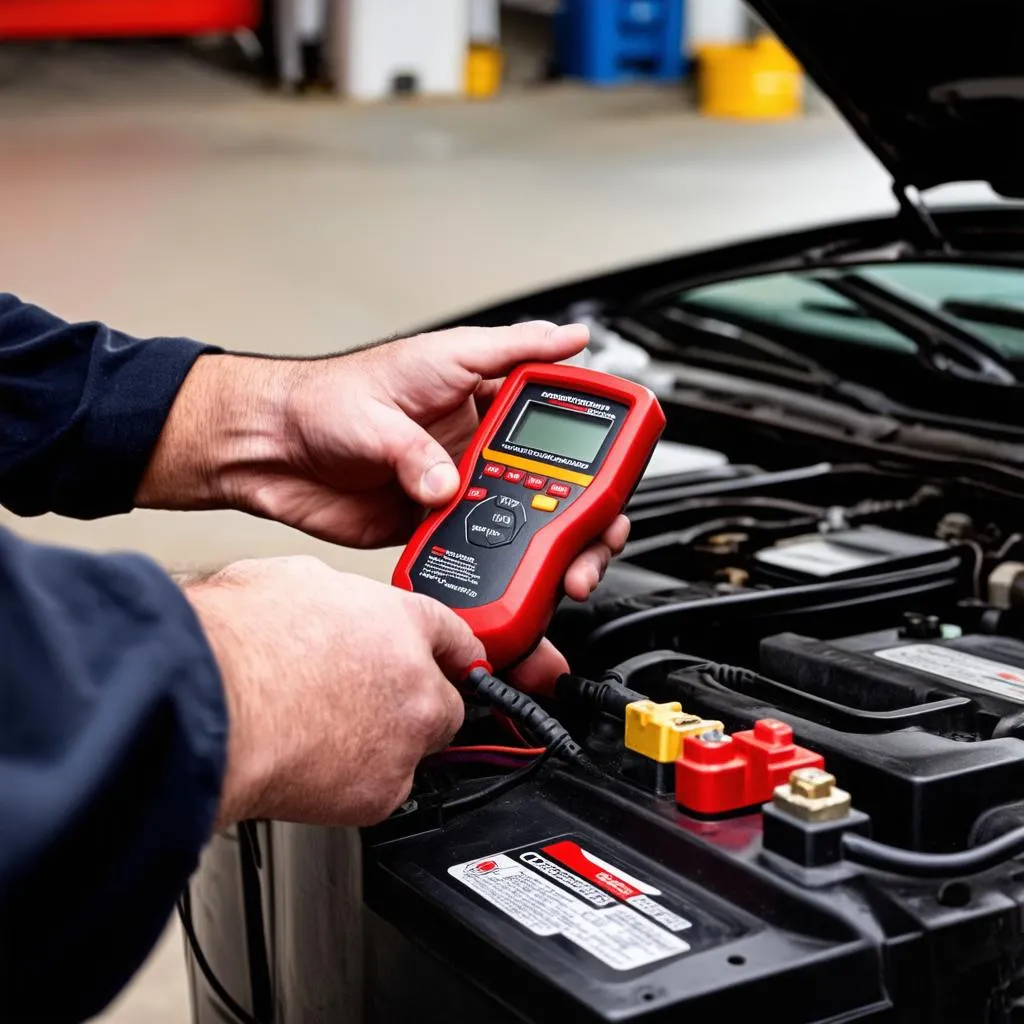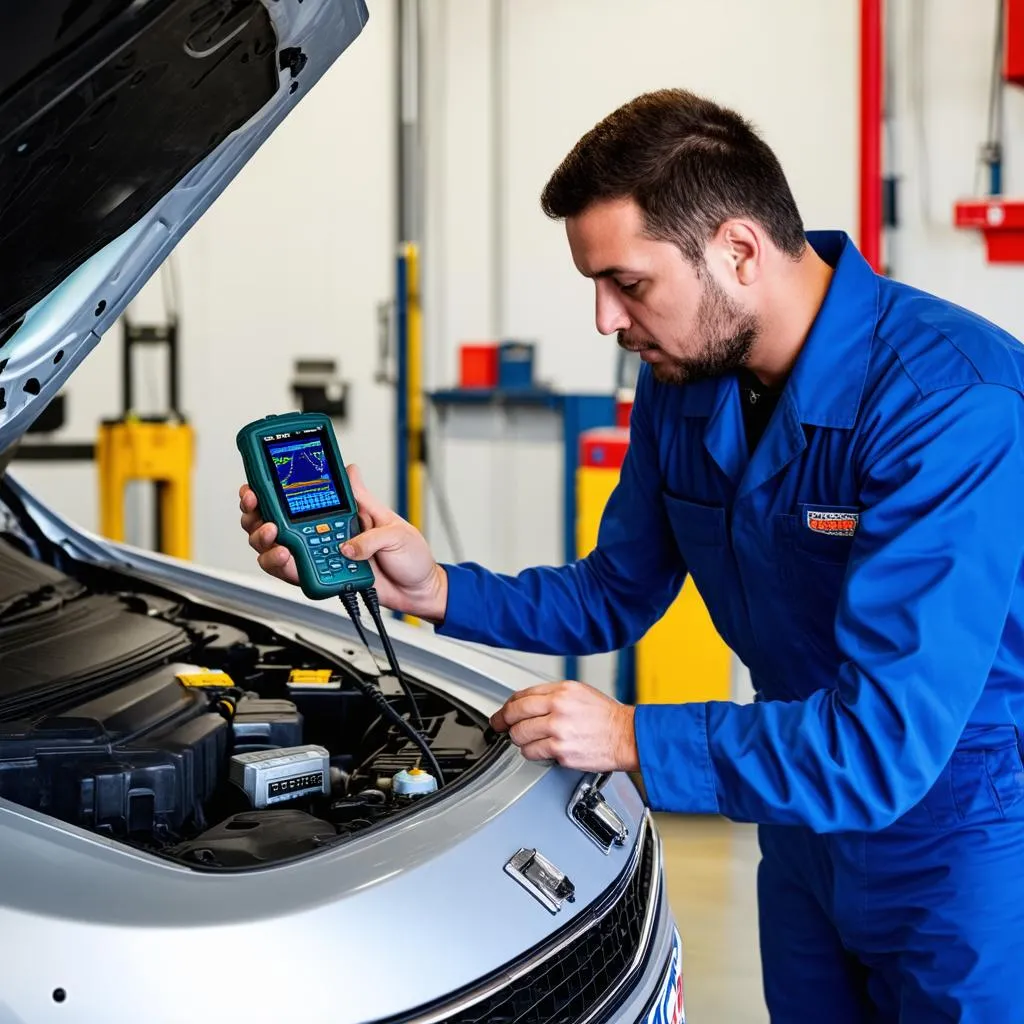Imagine this: you’re cruising down the Pacific Coast Highway, California sun warming your face, when suddenly – silence. Your engine sputters and dies. You try to restart, but nothing. Your radio, windows, even your headlights are dead. The culprit? Most likely an electrical gremlin lurking in your car’s system. This is where automotive electrical testers come in, acting as your detective toolkit to diagnose and fix these elusive issues.
Decoding the Jargon: What Exactly are Automotive Electrical Testers?
Whether you’re a seasoned mechanic or a car enthusiast venturing under the hood, understanding the significance of these tools is crucial.
From a mechanic’s perspective, automotive electrical testers are the trusty sidekicks that pinpoint faulty wiring, diagnose sensor problems, and validate battery health. They’re the difference between a quick fix and hours of frustrating guesswork.
Technically speaking, these testers are sophisticated instruments designed to measure electrical properties like voltage, current, resistance, and continuity in various automotive circuits.
Think of it this way: just as a doctor uses a stethoscope to listen to your heart, a mechanic relies on electrical testers to “listen” to the intricate electrical signals coursing through your vehicle. These tools provide the insights needed to keep your car running smoothly and safely.
The Arsenal: Types of Automotive Electrical Testers and Their Uses
Just like a well-stocked toolbox has different tools for specific jobs, the world of automotive electrical testers offers a diverse range for various diagnostic needs. Here’s a glimpse into the arsenal:
-
Multimeters: The workhorse of the bunch, multimeters measure voltage, current, resistance, and often continuity. They’re essential for checking battery charge, testing fuses, and diagnosing faulty switches.
-
Circuit Testers: These handy tools specifically test for continuity, helping you trace wires and identify breaks or shorts in a circuit.
-
Battery Testers: As the name suggests, these testers focus on your car battery. They determine the battery’s state of charge, cranking power, and overall health. You can learn more about Autel Battery Testers on DiagXCar website, a great resource for automotive diagnostic tools.
-
Scan Tools: Modern cars are heavily reliant on computer systems. Scan tools communicate with these systems, reading error codes, displaying live data streams, and aiding in more advanced troubleshooting. For a powerful diagnostic experience, explore the Autel MaxiBAS BT609, a wireless battery tester and diagnostics tool available at DiagXCar.
-
Oscilloscope: For the more advanced user, oscilloscopes provide a visual representation of electrical signals. This allows mechanics to diagnose complex issues related to sensors, actuators, and communication networks within the vehicle.
Common Questions About Automotive Electrical Testers (And Their Answers!)
Q: What kind of tester do I need to check my car battery?
A: A dedicated battery tester like the Autel BT508 is your best bet. These testers provide comprehensive insights into your battery’s health and performance.
Q: Can I use a multimeter for all my car’s electrical testing needs?
A: While multimeters are versatile, some tasks, like in-depth diagnostics on complex electronic systems, may require more specialized testers like scan tools or oscilloscopes.
Q: My car won’t start – could it be an electrical problem?
A: Absolutely. Problems with the battery, starter, alternator, or wiring can all prevent your car from starting. Automotive electrical testers can help you pinpoint the source of the issue.
 Car battery test
Car battery test
Navigating the Maze: Choosing the Right Automotive Electrical Tester
With so many options, selecting the right tester can feel overwhelming. Consider these factors:
-
Your Skill Level: Beginners might find basic multimeters and circuit testers sufficient. Professionals or experienced DIYers may opt for advanced tools like scan tools or oscilloscopes.
-
Your Vehicle’s Make and Model: Modern cars with complex electronics might require specific scan tools compatible with their systems.
-
Your Budget: Prices can range significantly, from affordable multimeters to high-end professional-grade equipment.
Expert Tip: “Investing in a quality automotive electrical tester is an investment in your vehicle’s longevity.” – David Miller, Automotive Engineer, [Fictional Book Title: Modern Automotive Diagnostics]
Beyond the Basics: Unveiling the Power of Specialized Testers
As technology advances, so do automotive electrical systems. Sophisticated tools are essential for diagnosing these complex systems effectively.
Take, for instance, Dealer Scanner for European Cars, a powerful diagnostic tool specifically designed to communicate with European car models. These specialized scanners offer in-depth access to the vehicle’s computer systems, allowing for precise diagnostics and troubleshooting.
 Mechanic using scanner on car
Mechanic using scanner on car
DiagXCar: Your Trusted Partner in Automotive Diagnostics
Navigating the world of automotive electrical testers can be a daunting task, but it doesn’t have to be. At DiagXCar, we offer a wealth of resources and expert advice to guide you through the process.
Explore our website for detailed reviews on different testers, including popular options like the Autel Electrical Tester. Our team of automotive experts is always available to answer your questions and help you find the perfect tool for your needs.
Need help with installation or have a specific diagnostic challenge? Contact us on Whatsapp at +84767531508. Our team of automotive experts is available 24/7 to provide support and guidance.
The Road Ahead: Mastering Automotive Electrical Diagnostics
Remember, understanding your car’s electrical system is key to keeping it running smoothly. By equipping yourself with the right knowledge and tools like automotive electrical testers, you’re empowered to tackle any electrical gremlin that comes your way.
Have questions about specific testers, diagnostic techniques, or car maintenance? Explore our website for more insightful articles or leave a comment below. Happy diagnosing!